Engender blog
All of Engender’s latest news. Reports, reviews, books, articles, and information from across Scotland’s women’s sector.
We would love to hear from other feminists around Scotland. Check out our guidelines for more information on how you can blog for us.
Engender statement on the weaponisation of violence against women and girls
-450.png) We are increasingly alarmed at the way women’s rights and safety are being weaponised to demonise minorities across the UK. This kind of distortion of the facts only causes harm to individuals and communities and does nothing to end violence against women and girls.
We are increasingly alarmed at the way women’s rights and safety are being weaponised to demonise minorities across the UK. This kind of distortion of the facts only causes harm to individuals and communities and does nothing to end violence against women and girls.
As Engender, we want to add our voice to calls for action against the spread of hate and misinformation, and for protection and safe and legal routes to be provided for people fleeing war and crisis to the UK. We also want to express our solidarity with racialised and other minority communities who are being made to feel unsafe by hate speech, incitement of violence and far-right protests, including here in Scotland.
Men’s violence against women and girls is endemic in our society and is caused by gender inequality. Spreading inaccurate and hateful rhetoric only generates more violence and creates a distraction from the political commitments that are needed to address it. Improvements to our social security system, investment in childcare, social care, education, housing and community resources, are the things that make a real difference to women.
The false and racist narratives these groups are promoting ignore the fact that violence against women and girls is most commonly perpetrated by someone close to the victim. Last year, the UN reported that the home is the most dangerous place for women, with 60% of women killed by men globally in 2023 dying at the hands of a partner or family member. Two out of every five people arrested during far-right riots in summer 2024 had previously been reported to the police for domestic abuse.
Racism, Islamophobia and anti-migrant attitudes play a major role in the increased risk of violence that women of colour, asylum-seeking and refugee women face.
The UK’s asylum and immigration systems compound this harm, particularly through the brutal No Recourse to Public Funds (NRPF) condition, which increases women’s risk of gender-based violence and restricts access to support, including refuge accommodation.
Invitation to Tender: Equal Representation 2025/26 Candidate Research.
-750.png)
Engender’s Equal Representation in Politics Project aims to help create a Scotland where there is sustainable equal representation of women in all their diversity in politics, ensuring women’s perspectives shape decision-making, reducing gender inequality, and creating better outcomes for women and society.
The project seeks to create change by encouraging all those who hold power to shape the political landscape, including political parties, councils, government, and parliament, to take action to increase the representation of women and improve levels of diversity among women’s representation.
We are seeking a consultant:
- To review and collate a list of women MSPs who have publicly stated that they intend to stand down before the Holyrood 2026 elections.
- To review and collate the reasons given publicly by these MSPs for reaching the decision to stand down.
- To compile a list of candidates for each major party for the Holyrood 2021, broken down by protected characteristic where possible.
- To compile a list of candidates for each major party for the Holyrood 2026, broken down by protected characteristic where possible.
- To create and circulate a survey, and analyse and collate findings, of all women MSPs standing down on the factors that influenced their decision.
The deadline for tenders to be submitted is 5pm, Monday 15th September.
Please find all the details and how to apply, here.
Engender launches report on women’s experience of the election process
Today, Engender has launched a new report: Women’s political journey: Exploring the election process and women’s experiences of abuse, exclusion and bias, including vital recommendations for improvement. Find out more about the report below.
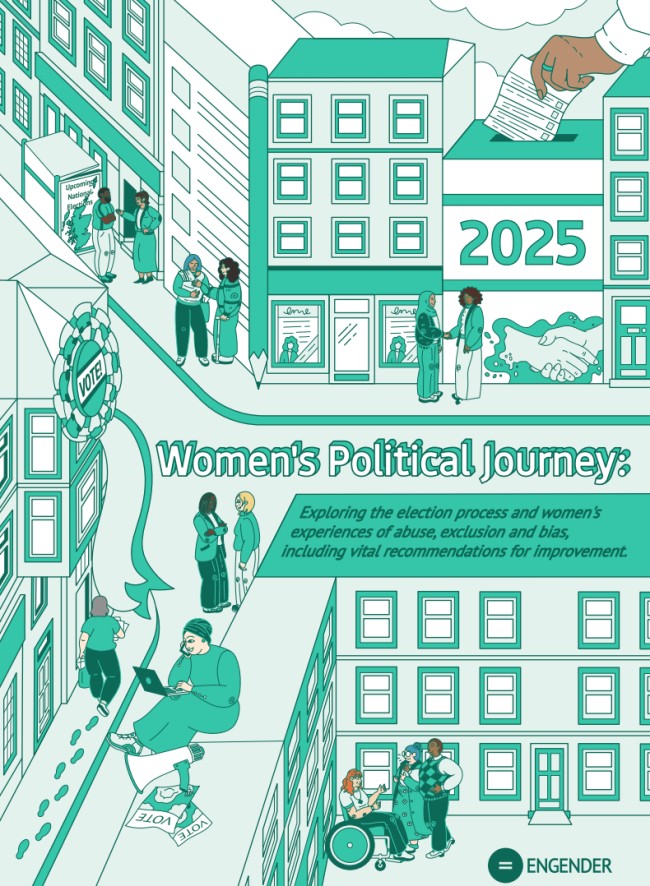
“Someone said to me [during the election] and I quote, ‘we can’t win here with someone who looks like her.”
The political arena is becoming increasingly hostile, especially for women and marginalised women.  Engender’s new report ‘Women’s Political Journey’ explores the candidate journey—from preparing to stand as a candidate, including all the interview and vetting processes, to being elected and what happens after.
Engender’s new report ‘Women’s Political Journey’ explores the candidate journey—from preparing to stand as a candidate, including all the interview and vetting processes, to being elected and what happens after.
There is still an image of the ideal candidate as white, middle-class, able-bodied, and male. For anyone who falls outside these categories, this means being prepared for additional barriers.
Our report shows that over 70% of respondents to a question on forms of abuse reported experiencing online harassment or trolling during their campaign. Only 11% felt “very safe” during their campaign period.
A survey respondent told us:
“I have been spat on, shouted at, abused and physically shoved countless times.”
Sexist bullying is a persistent problem within some branches and local parties, with findings indicating that disabled and minoritised women may be at increased risk. These experiences can cause women to question their positions and political futures. It is widely recognised that social media presents significant risks for women in politics, with Black and minority ethnic women at greatest risk.
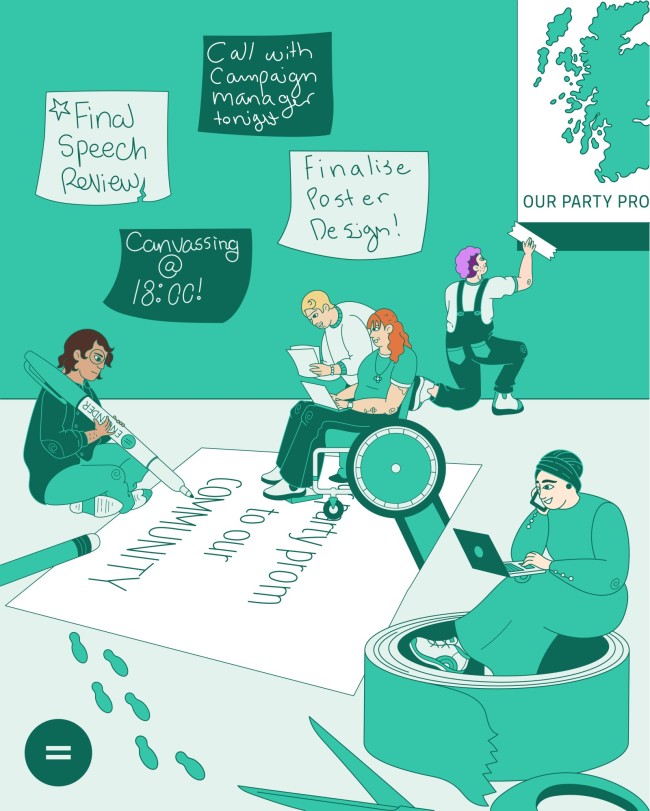
57% of our survey respondents felt that positive action measures (PAMs) like quotas or all-women shortlists are ‘resented’ by some party members who feel their use is unfair or unnecessary. As has been reported to us, white men especially refuse to make space for other groups if it means sharing their privilege. Others reported only tokenistic acceptance of PAMs, reducing the ultimate impact of measures.
Very few parties are consistently collecting equalities monitoring information on prospective candidates. This is vital when it comes to ensuring candidate diversity and proportionate representation of Scotland’s communities.
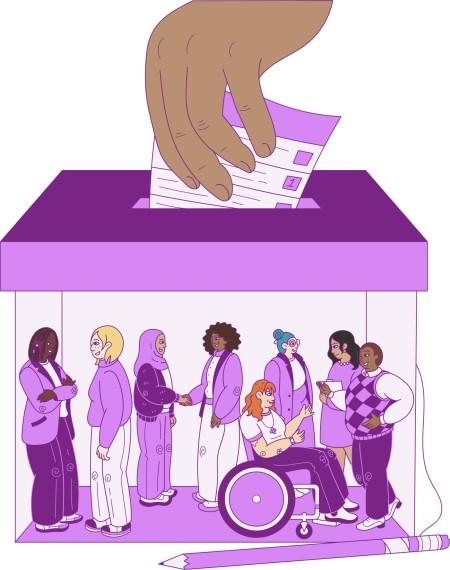 Equal Representation Development Officer Noomi Anyanwu states:
Equal Representation Development Officer Noomi Anyanwu states:
“Abuse, lack of support, and biases were reported widely among our survey participants and interviewees. Nearly 30% would not recommend candidacy to underrepresented groups. It’s understandable considering what women must endure to make it as politicians, but we don’t want to settle for this.”
“Change needs to happen, so we urge political parties, governments, councils, and other stakeholders to implement measures and commit to equal and diverse representation. I want to see at least 50% women in our parliaments—for that to happen, we need to see a real culture change first.”
Read the full report including vital recommendations for action here.
29 Organisations Urge Police Scotland to Reject “Disgraceful” Abortion Investigation Guidelines
This week, we united with 28 other women’s rights, health, and human rights groups to condemn UK police guidance that subjects grieving women experiencing pregnancy loss to criminal investigation.
We have written to Chief Constable Jo Farrell calling on Police Scotland to publicly reject controversial new guidelines that could subject women experiencing pregnancy loss to invasive criminal investigations, under existing abortion laws.
The signatories – spanning women’s rights groups, abortion care providers and campaigners, healthcare bodies, human rights and equalities organisations and trade unions – have joined us in condemning the UK National Police Chiefs’ Council (NPCC) guidance on child death investigation as “disgraceful” and “misogynistic by design.”
The updated guidance, comes after a dramatic upswing in abortion related investigation and prosecution of women in England and Wales. Earlier this week the UK Parliament moved to halt criminal sanctions against women for terminating their own pregnancies via a successful amendment to the Crime and Policing Bill.
However, as this legislation only relates to England and Wales, a lack of clarity remains on whether these guidelines could still apply or be used in Scotland. Data published last year by Engender found that several abortion related cases have been pursued by police in Scotland in the last two decades.
Speaking about the need for action north of the border, our Executive Director of Engender, Catherine Murphy said:
“Women now find themselves in the perilous situation where the laws governing abortion in Scotland have not kept up with advancements like abortion medicines and reproductive tracking apps. Police Scotland, the Crown Office and Scottish Parliament need to act urgently to end the scope for prosecutions and bring the law into the 21st century.”
“The NPCC guidance describes women being targeted as ‘criminal suspects’ during one of the most sensitive and vulnerable experiences of their lives – pregnancy loss. It’s unconscionable.”
The controversial NPCC guidelines outline scope for highly invasive investigation techniques including:
-
Searching women’s homes and treating them as crime scenes
-
Confiscating digital devices and reviewing personal data
-
Accessing medical records and reproductive tracking apps
-
Subjecting families to criminal investigation during bereavement
Healthcare leaders have been unanimous in their opposition. The Royal College of Obstetricians and Gynaecologists described the guidance as “shocking,” and clinicians warn it creates a “climate of fear” among healthcare staff.
“Women experiencing pregnancy loss need compassionate care, not criminal investigation,” said Dr Sinead Cook, Chair of the Faculty of Sexual and Reproductive Healthcare, Scotland Committee. “These methods violate fundamental rights to dignity, privacy and healthcare.”
The letter warns that marginalised communities – including those in poverty, women of colour, disabled women, migrants, young women, LBT+ people, and those in rural areas – would be disproportionately impacted by such investigations. Evidence from England shows similar police actions have caused “life-changing harm,” resulting in severe mental health impacts, debt, and children taken into custodys.
The World Health Organisation has explicitly called on governments to stop arrests, investigations and prosecutions for abortion and to suspend the criminal law being applied to pregnancy loss – a position supported by every major UK medical body.
Signatories call on Police Scotland to:
-
Publicly clarify that NPCC recommendations on abortion and stillbirth will NOT be adopted in Scotland
-
Develop new guidance creating an effective moratorium on abortion investigations, aligned with WHO recommendations
“Police Scotland has a choice,” said Jill Wood, Policy Manager at Engender, “They can follow the lead of health experts and human rights bodies, or they can adopt guidance that will cause demonstrable harm to women in Scotland. We urge them to choose compassion over criminalisation.”
Signatories include Engender, Abortion Rights Scotland, Young Women’s Movement, Back Off Scotland, Humanist Society Scotland, Close the Gap, Scottish Women’s Convention, Scottish Women’s Budget Group, Zero Tolerance, Rape Crisis Scotland, Scottish Abortion Care Providers Network, Faculty for Sexual and Reproductive Healthcare Scotland, Amnesty International UK, Scottish Women’s Aid, Royal College of Midwives, STUC, Royal College of Obstetricians and Gynaecologists, Equality Network, Scottish Trans, Equate Scotland, Human Rights Consortium Scotland, British Pregnancy Advisory Service, Women’s Enterprise Scotland, Liberty, Coalition for Racial Equality and Rights, Amma Birth Companions, NUS Scotland, Health and Social Care Alliance Scotland (the ALLIANCE), Inclusion Scotland.
Guest Blog: Gender and precarity in the 21st century workplace – universities and beyond
Even before the pandemic, women’s employment was increasingly precarious. Work from our sisters at Close the Gap shows that women are more likely to be in insecure work, on zero hours or temporary contracts, and are two-thirds of workers earning less than the real living wage. Black and minoritised women are overrepresented in precarious work, and are more likely to be on zero hours contracts.
Today on our blog, researchers Dr Lena Wånggren and Dr Cécile Ménard share their work on the gendered impact of job insecurity and precarity, and why we need to make women’s unpaid, unrecognised work visible. Illustrations throughout are by Maria Stoian.
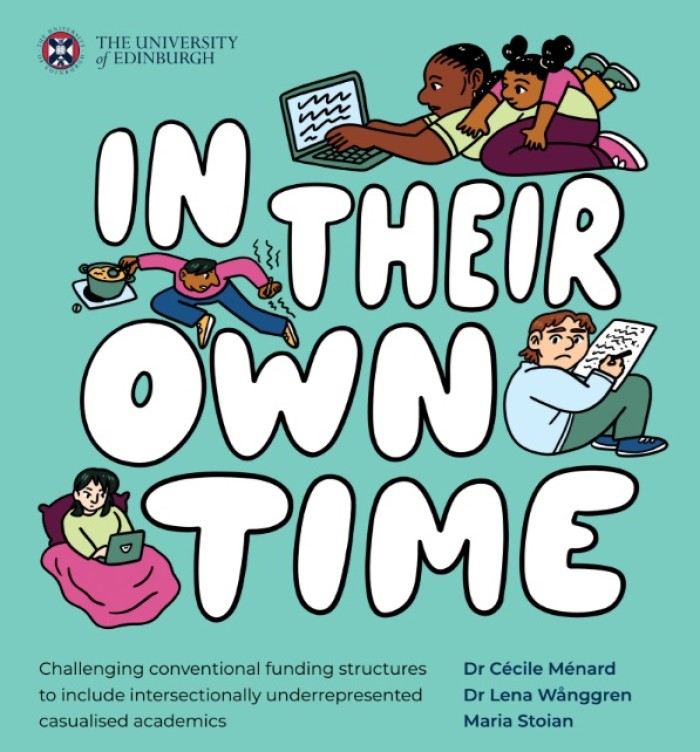
Casualisation – the precarisation of work, in which core business previously done by colleagues in permanent jobs is done on an hourly, fixed-term, sessional, and one-off basis – is a key feature of the 21st-century workplace.
This blog post, written by two long-term insecurely employed feminist researchers at a Scottish university, shares research on job insecurity and inequalities in the UK workplace. Making visible women’s unpaid and invisibilised work and the intersectionally gendered impacts of job insecurity, we highlight what needs to change.
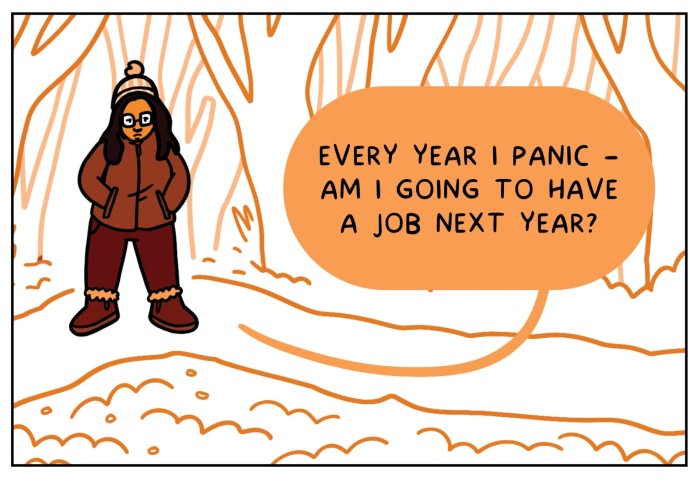
The gendered impact of job security
Job insecurity has become the norm in UK workplaces, especially since the 2008 financial crisis and the austerity measures that followed, when anti-feminist cuts to social infrastructure went hand in hand with anti-worker legislation and policies across sectors. UK Universities, once seen as a prestigious place of privilege, are one of the most casualised (that is to say, reliant on insecure contracts) sectors in the UK: around half of academic staff are employed on insecure contracts, and higher education is the second most casualised sector in the UK after hospitality.
Precarity is not experienced equally. Migrants and racially minoritised persons are more likely to be employed on insecure contracts and, in fact, more likely to be in severely insecure work. While trade unions, feminist researchers and campaign groups have highlighted the detrimental and intersectionally gendered impact of job insecurity, including the exacerbated risk of sexual and racial violence, there is a lack of action among employers and governments to tackle the problem. To address the equalities impact of contractual precarity, we need an intersectional feminist perspective with a focus on workplace justice.
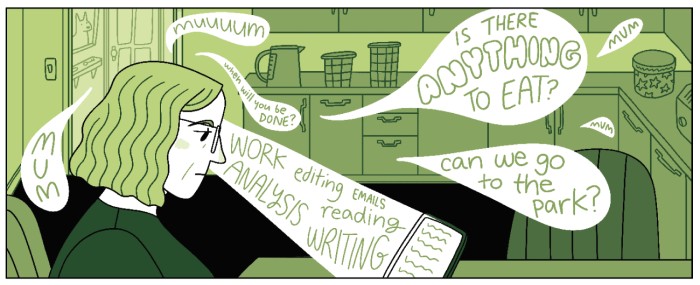
Job security is a workplace issue and a gender equality issue
There are two ways in which we approach gender and precarity in the workplace: from an intersectional feminist framing and from the issue of workplace justice. In the context of our 21st-century precarisation of work across sectors, with gig economy and platform models spreading, and the gendered and intersectional impacts of such an economy, specific problems need tackling. One specific and urgent issue is the financial instability of women in precarious work, with dependency on a partner related to risks of gender-based violence, especially for groups of migrant women who have no recourse to public funds. Family planning is affected when a stable job or living situation is not on the horizon. Job security is both a workplace issue and a gender equality issue.
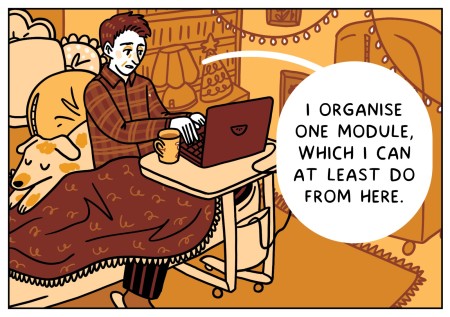 The university sector – still seen by many as a prestigious place of privilege – reproduces the same structural inequalities as the broader society. More than 40% of teaching staff are on hourly or zero-hour contracts that often do not pay enough to live on, with some relying on food banks to get by. While hourly workers are underpaid for the amount of work they are contracted to do, and the work is insecure, researchers are usually on fixed-term contracts, and are encouraged to apply for prestigious awards and grants for their careers in their own time. If they are successful, there is no guarantee of job security; the prestige and cashflow benefit the institution while the worker remains expendable.
The university sector – still seen by many as a prestigious place of privilege – reproduces the same structural inequalities as the broader society. More than 40% of teaching staff are on hourly or zero-hour contracts that often do not pay enough to live on, with some relying on food banks to get by. While hourly workers are underpaid for the amount of work they are contracted to do, and the work is insecure, researchers are usually on fixed-term contracts, and are encouraged to apply for prestigious awards and grants for their careers in their own time. If they are successful, there is no guarantee of job security; the prestige and cashflow benefit the institution while the worker remains expendable.
Women’s unpaid work in universities and beyond
In our current research project, In Their Own Time, we have partnered with our trade union, UCU, to examine a key problem in struggles for gender equality: the undervaluing of women’s work. Unpaid labour has long been at the heart of the feminist struggle. From the Wages for Housework campaign to the work of scholars such as Selma James, Dorothy Smith and Patricia Hill Collins, feminists have shown that defining ‘work’ only as paid labour renders invisible the gendered, racialised labour that keeps institutions—and societies—going. While reproductive work, such as care work, is gendered and racialised, women’s work across society is also underpaid, undervalued, and invisibilised, with the labour market maintaining sexist, racist and ableist structures. This gendered undervaluing of work shows through in expectations of unpaid work and lack of support structures in the academic workplace.
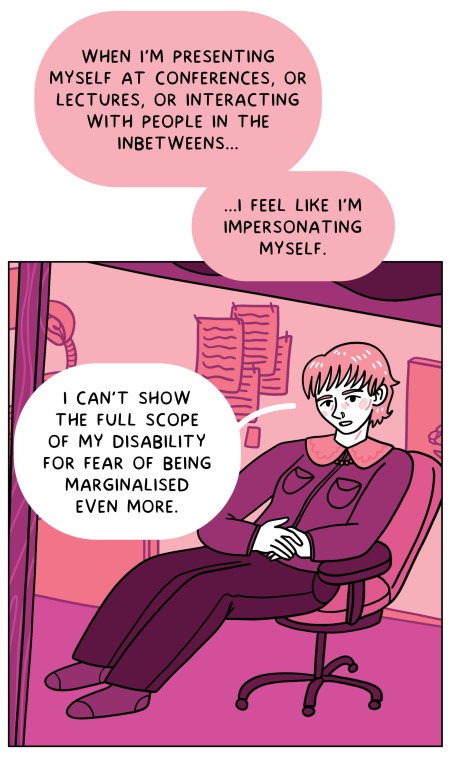 Working with the fantastic feminist illustrator Maria Stoian, the participants in the project tell stories of combining paid and unpaid work, visa applications, health issues, and a range of insecure jobs. Steph, a single mum who juggles housework, childcare, and two insecure jobs, states: ‘Every year I panic – am I going to have a job this year?’ What she calls her ‘own time’ is at night when she does emails for her jobs after her child has gone to bed. Susie, a casualised researcher for 20 years, remarks on the expectation of working unpaid in academia, for example, applying for funding in her own time even when not paid for it: non-academic colleagues think ‘it’s crazy’, but in academia, it’s normalised. She highlights that not everyone can work for free – with childcare responsibilities, she needs flexibility. Alex is a disabled academic whose disability has been made worse by precarity. Another participant, Eimhir, explains that she spends managing her chronic health condition alongside paid work and cannot fit in further unpaid academic work even if this is required to succeed in the university. Olivia, a mum and researcher, keeps her work with her all the time – including marking dissertations by the pool when the kids are at swimming lessons on Saturday morning. Meanwhile, Gwen is a trans academic in precarious part-time jobs: she gives lectures, does research, organises events, and supports her colleagues, all unpaid in her spare time.
Working with the fantastic feminist illustrator Maria Stoian, the participants in the project tell stories of combining paid and unpaid work, visa applications, health issues, and a range of insecure jobs. Steph, a single mum who juggles housework, childcare, and two insecure jobs, states: ‘Every year I panic – am I going to have a job this year?’ What she calls her ‘own time’ is at night when she does emails for her jobs after her child has gone to bed. Susie, a casualised researcher for 20 years, remarks on the expectation of working unpaid in academia, for example, applying for funding in her own time even when not paid for it: non-academic colleagues think ‘it’s crazy’, but in academia, it’s normalised. She highlights that not everyone can work for free – with childcare responsibilities, she needs flexibility. Alex is a disabled academic whose disability has been made worse by precarity. Another participant, Eimhir, explains that she spends managing her chronic health condition alongside paid work and cannot fit in further unpaid academic work even if this is required to succeed in the university. Olivia, a mum and researcher, keeps her work with her all the time – including marking dissertations by the pool when the kids are at swimming lessons on Saturday morning. Meanwhile, Gwen is a trans academic in precarious part-time jobs: she gives lectures, does research, organises events, and supports her colleagues, all unpaid in her spare time.
As seen in our project, the reliance on intersectionally gendered unpaid labour creates further inequalities because it excludes those whose own time is other people’s time – such as those with caring responsibilities, the majority of whom remain women – or those whose own time is recovery time, as is the case for many disabled individuals.
Job security now!
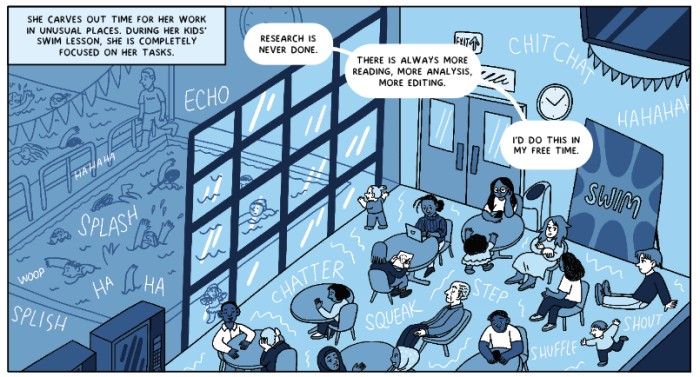
Precarity is everywhere: environmental, geopolitical, and at work. We can make distinct policy changes to address this: we need decent, secure jobs for women and for all - that is key to gender equality. Together with trade unions, workers’ organisations, and feminist organisations, we call for immediate institutional and governmental action on job insecurity, intersectional gender inequality, and an end to the invisibilisation of women’s work. Addressing job insecurity requires more than reforming individual contracts—it demands dismantling the structures that normalise insecure, unpaid labour as inevitable. Such action extends far beyond universities. Across sectors, a renewed feminist politics of labour is urgently needed—one that centres care, builds intersectional solidarity and challenges the exploitation of those whose time has always been devalued.
This project was supported by the UKRI and the British Academy Funding through the Equality, Diversity and Inclusion Caucus (ES/X008444/1)
Recommended viewing: Our Time Is Coming Now (BBC, Selma James & Michael Rabiger, 1970)
Guest posts do not necessarily reflect the views of Engender, and all language used is the author’s own. Bloggers may have received some editorial support from Engender, and may have received a fee from our commissioning pot. We aim for our blog to reflect a range of feminist viewpoints, and offer a commissioning pot to ensure that women do not have to offer their time or words for free.
Interested in writing for the Engender blog? Find out more here.
Downloads
 Engender Briefing: Pension Credit Entitlement Changes
From 15 May 2019, new changes will be introduced which will require couples where one partner has reached state pension age and one has not (‘mixed age couples’) to claim universal credit (UC) instead of Pension Credit.
Engender Briefing: Pension Credit Entitlement Changes
From 15 May 2019, new changes will be introduced which will require couples where one partner has reached state pension age and one has not (‘mixed age couples’) to claim universal credit (UC) instead of Pension Credit.
 Engender Parliamentary Briefing: Condemnation of Misogyny, Racism, Harassment and Sexism
Engender welcomes this Scottish Parliament Debate on Condemnation of Misogyny, Racism, Harassment and Sexism and the opportunity to raise awareness of the ways in which women in Scotland’s inequality contributes to gender-based violence.
Engender Parliamentary Briefing: Condemnation of Misogyny, Racism, Harassment and Sexism
Engender welcomes this Scottish Parliament Debate on Condemnation of Misogyny, Racism, Harassment and Sexism and the opportunity to raise awareness of the ways in which women in Scotland’s inequality contributes to gender-based violence.
 Gender Matters in Social Security: Individual Payments of Universal Credit
A paper calling on the Scottish Government to automatically split payments of Universal Credit between couples, once this power is devolved to the Scottish Parliament.
Gender Matters in Social Security: Individual Payments of Universal Credit
A paper calling on the Scottish Government to automatically split payments of Universal Credit between couples, once this power is devolved to the Scottish Parliament.
 Gender Matters Manifesto: Twenty for 2016
This manifesto sets out measures that, with political will, can be taken over the next parliamentary term in pursuit of these goals.
Gender Matters Manifesto: Twenty for 2016
This manifesto sets out measures that, with political will, can be taken over the next parliamentary term in pursuit of these goals.
 Scottish NGO Briefing for UN Special Rapporteur on Violence Against Women
Joint briefing paper for the UN Rapporteur on Violence Against Women.
Scottish NGO Briefing for UN Special Rapporteur on Violence Against Women
Joint briefing paper for the UN Rapporteur on Violence Against Women.

Newsletter
Sign up to receive our newsletter here:
Sign up to our mailing list
Receive key feminist updates direct to your inbox: